Linguine with White Clam Sauce
February 18, 2019 | Updated June 24, 2022
As an Amazon Associate I earn from qualifying purchases.
Red or white? That was always the question at the old Italian restaurants I used to hang out at. The question, of course, refers to red or white clam sauce. I prefer clams in white sauce.
Why? Because even as a kid, I thought the lighter white clam sauce highlighted the clams more than the red one. I still think so.
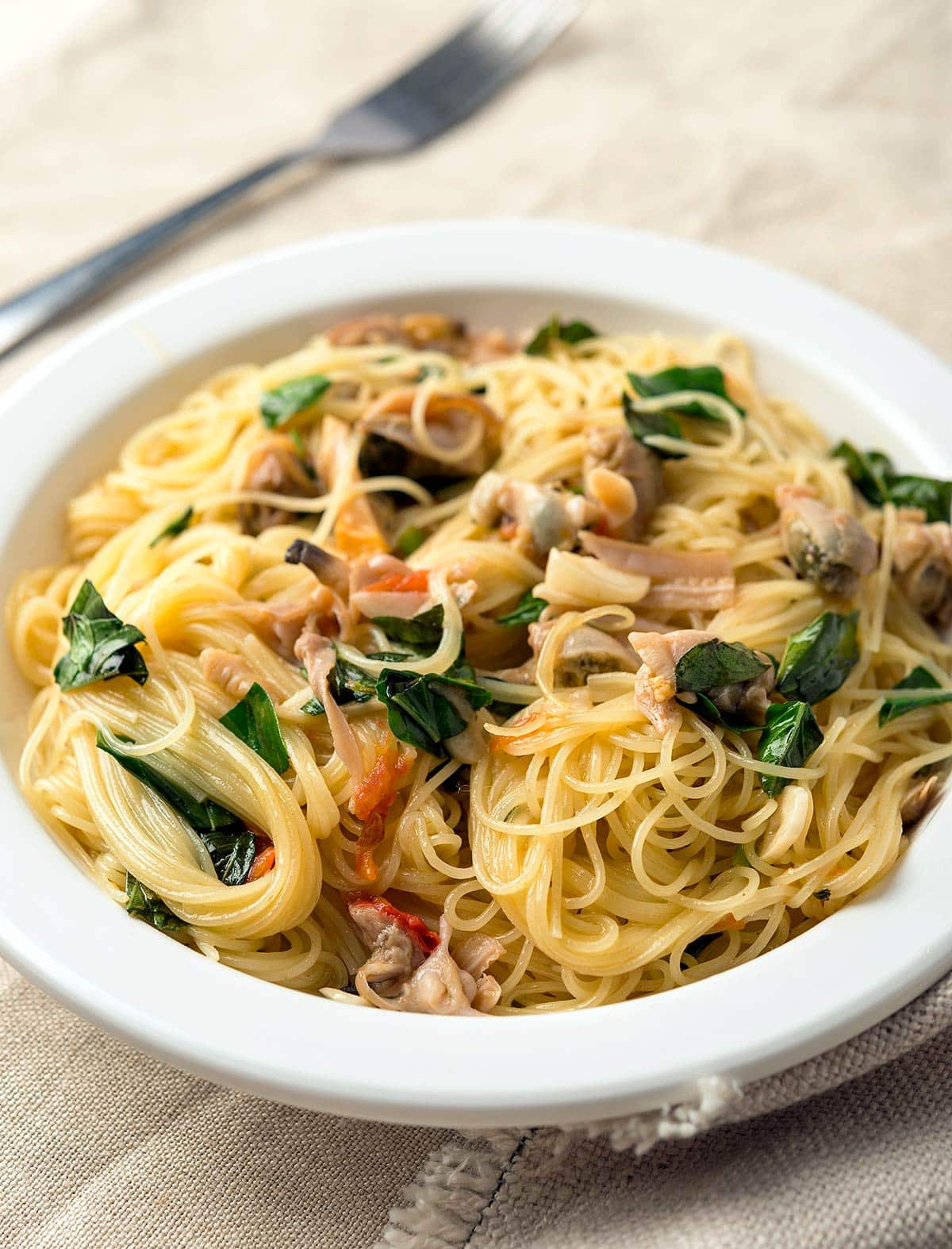
Clams in white sauce has its origins in Italy, but like many Italian-American classics, this rendition is very American. Heavy on garlic and white wine, the sauce is light… unless you get a version where the cook wants to drown everything in butter or olive oil. Meh.
White clam sauce is very similar to that other Italian seafood classic, shrimp or scallop scampi, in its reliance on garlic and oil or butter. I tend to be less restrained on the garlic, and more restrained on the butter or oil.
I’ll typically use an ordinary olive oil to cook things, then drizzle a really good extra-virgin olive oil over everything at the end. No butter for me, but you can use some if you prefer.
Beyond the canons of garlic, white wine and olive oil, you have some leeway where you want to go next. Fresh herbs? Go for it. I like basil in summer and parsley in winter. Tomato? Sure, but only as an accent. Maybe a little spoonful of tomato paste, like a teaspoonful, but I prefer to toss in just a few cherry tomatoes or one plum tomato.
I got that tip from Marcella Hazan’s recipe in her classic book Essentials of Classic Italian Cooking, which is to Italian food what Julia Child’s Mastering the Art of French Cooking is to French food. As a New Jersey native, I was surprised to see tomato in Marcella’s white clam sauce. But then it is only one large plum tomato, seeded and diced. More of an accent than the base of a sauce.
If you can, use fresh clams in the shell. Many restaurants like to keep the clams in the shell for presentation, but as pretty as that looks, it makes your white clam sauce harder to eat.
I use Western littleneck clams, Leukoma staminea, because that’s what lives near me in California. Manila clams or Eastern littlenecks, which happens to have my favorite Latin name: Mercenaria mercenaria, are every bit as good. Whatever the species, littlenecks are gold in these parts: Hard to find but easy to dig, delicious, and living in spots that can be easily overfished.
No fresh clams? Sure you can use canned clams for your white clam sauce, and, I’ll be honest, it’s one of the better uses for them. The white wine tames any fishiness.
Linguine with white clam sauce is the classic, but I find that spaghetti, spaghettini, even angel hair is nice here, and there is no reason not to use a short pasta if that is what you like. Dry pasta is the norm here, not freshly made.
This is not a sauce that keeps well. Make it, enjoy it, and move on. You can freeze it if you must, but it won’t be as good once thawed.
Classic White Clam Sauce
Ingredients
- 20 to 30 small hardshell clams
- 1 1/4 cups white wine, divided
- 5 tablespoons extra virgin olive oil, divided
- 3 garlic cloves, sliced thin
- 1/2 teaspoon red pepper flakes
- 1 pound linguine, spaghetti or other pasta
- 1 large fresh plum tomato, seeded and diced
- 3 tablespoons fresh basil, torn into pieces
- Black pepper to taste
Instructions
- Make sure the clams are clean; scrub them with a stiff brush under cold water if you need to. Lay them in a large, wide pot no more than 2 clams deep. Pour over 3/4 cup of white wine. Cover the pot and bring to a boil. Turn the heat down to a simmer and steam open the clams. Pay attention and pluck out each clam as it opens -- this prevents them from being overcooked. Remove the clams from their shells and cut large ones into 2 to 3 pieces. Put them in a bowl with a tablespoon of the olive oil and toss to coat. Set aside for now.
- Discard the shells. Strain the liquid in the pan by pouring over a fine-meshed strainer with a paper towel set inside it that has been set over a bowl. Reserve the strained liquid.
- Wipe out the pan and add 2 tablespoons olive oil. Turn the heat to medium-high and sauté the garlic for about 1 minute; don't let it brown. Add the red pepper flakes and the remaining white wine. Boil this for 1 minute, then add the reserved clam juice. Turn off the heat.
- Boil the pasta in a large pot of salty water. When it is almost done -- very al dente, as in just barely crunchy in the center -- move the pasta to the pan and turn the heat to high. When it begins to boil, toss the pasta with the sauce constantly so the pasta is evenly coated. Add the reserved clams and the tomatoes while you are doing this. The pasta should be fully cooked in 30 seconds to 1 minute. When it's perfect, turn off the heat, drizzle over the remaining olive oil, and mix in the basil. Serve at once.
Notes
- Use the same white wine you are going to drink with dinner, like a pinot grigio, Sancerre, Albariño or Verdelho.
- If you only have large clams, you can finely chop them first. This will limit their chewiness and they'll still be nice. You can grind them, too.
- If you have some really good olive oil, use that for the final drizzle at the end.
- You can mince parsley, maybe 3 tablespoons, and add that to the pan when you add the cooked pasta. This is what I do in winter.
- I've done this exact recipe with little oysters, smoked mussels, crabmeat, small shrimp and crawfish tails. All are good.
Nutrition
Nutrition information is automatically calculated, so should only be used as an approximation.
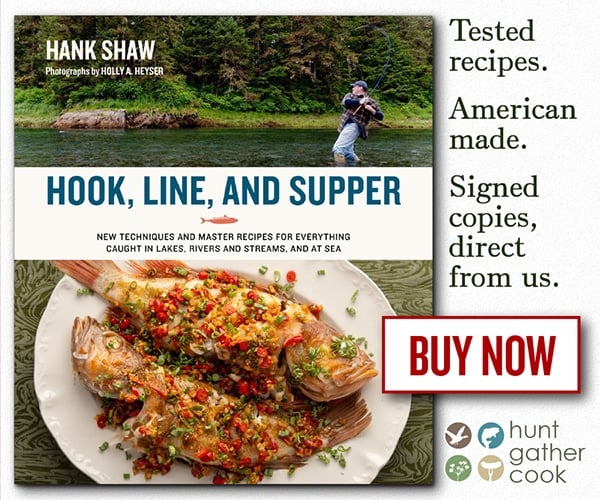
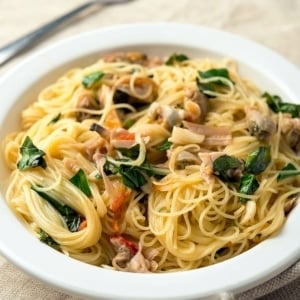
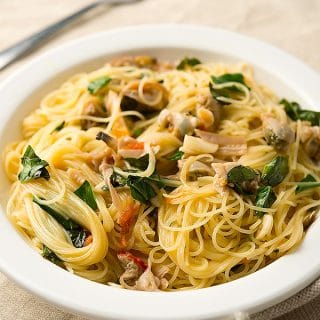
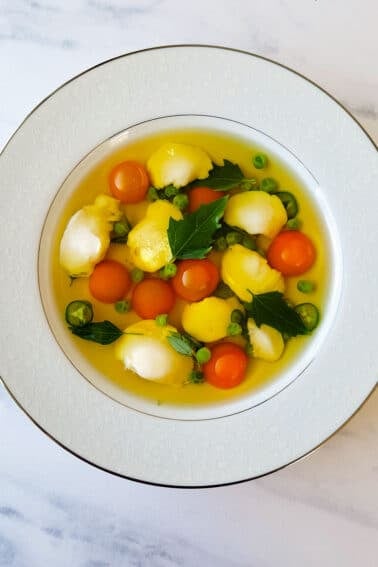
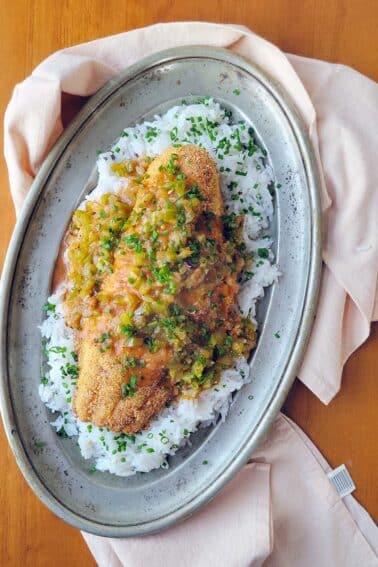
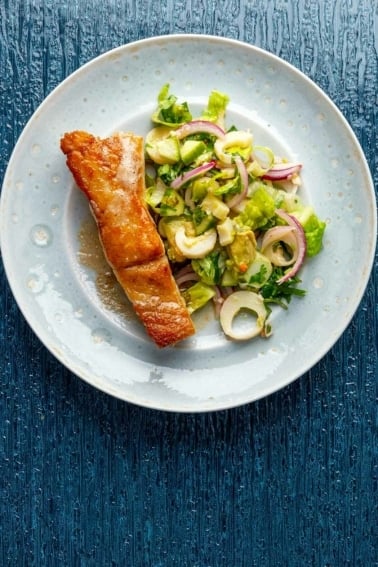
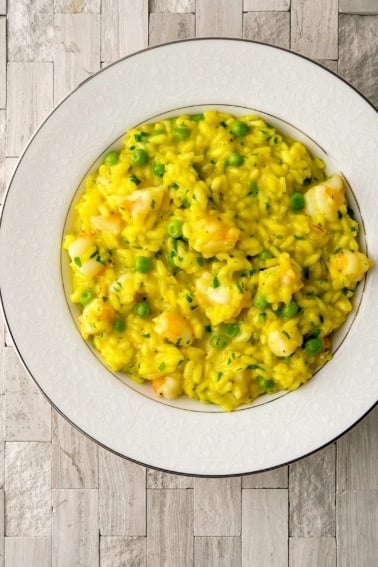
This was quite good! It was the first time I’ve ever had clams and I think this recipe was a good choice!
Hello Hank,
I am envious that you get to dig clams. I live in Minnesota and all bivalves are protected species, with no open seasons.
However, we are blessed with a profusion of fungi, and lobster mushrooms are very common.
What are your thoughts on subbing out the clams for lobster mushrooms? Or any mushrooms for that matter?
Do you typically purge your littlenecks? I made this for the wife two weekends ago – have made it dozens of times before the same way, and while I scrubbed the shells well, i didn’t soak the clams in water to purge. This time, I felt like the clams had a slight “muddy” taste. I see most recipes call for purging, which I have never done before. Maybe I just did a poor job of scrubbing.
Tony: Absolutely I do. But if you bought your clams, they should already be purged.
I’ve got some canned clams that a friend caught in the Iles de Madelaines off the coast of Quebec. I don’t know what kind they are. Do you think this dish would work well with them (just skipping steps 1 & 2)?
Willoughby: Only one way to find out! Just make sure the clam bits are small, and if they’re not, chop them.
Enjoyed reading your latest food article. Yeah! So happy you found Little Neck Clams and made the white sauce. Also happy you got to finally meet your email friend and had fun together.
Cheers!
Mum
Think this would work with Pismo clams?
Brad: Sure, but you would need to chop them a bit, as Pismo clams are pretty large.
Hi Hank, Thanks for a great recipe. It brings back a lot of memories.
I grew-up on Connecticut’s southeastern shoreline and there were many summer mornings, spent with friends, gathering clams for an unnamed feast. The clam sauce was always slightly different: depending on what could be found in our neighborhood gardens … And the pasta was whatever we could find in one of our parent’s cupboards. The variations are and were endless. Again, thank you.
I can taste the seaside from here.You never fail to get my taste buds going. Thanks again for a great recipe idea.
Read this at 7am and can hardly stand the memories- my Maineiac aunt making this on the old stove at her camp on the lake (only parsley available and she used lots), my mom’s attempt to make her Maine version with the razor clams we dug on the Oregon coast and cooked on the stove in our camper ( chewy), the versions that the small locally owned Italian restaurants in eastern Massachusetts made so well. Never saw tomato but I usually had my eyes closed inhaling the smells- clams, brine, garlic, the sea, mmmmm
It is always amazing how much liquor the clams give up! I’ve made this recipe straight up and have springboarded, but always come back here to start. Great recipe. Thanks
I’ve made this recipe a couple of times and it’s very good. Thanks! I usually end up with a mixed bag of species from my clamming here in WA state. Large butter and horse clams, as well as some larger little neck and cockles. To me, it doesn’t really matter. They all taste great with the rest of the ingredients and when not overcooked, all of these species stay tender and are delicious. The last batch I made, I added a little pat of butter at the end. I like the silkiness it added. Just dug my first batch of clams this year and am probably going to make this again tomorrow. Pasta with white clam sauce isprobably one of my favorite foods. thanks for this site, it’s great.
I just made this recipe with fresh Pismo clams we dug up yesterday and it was phenomenal! A big hit with my whole family and they are a pretty picky bunch. Thank you!
The family was based in the Bronx when I grew up, I got to try dozens of versions of spaghetti and white clam sauce. After all that I always go back to Craig Claiborne’s Favorites, Vol. 2, NY Times Books, 1976. The first recipe is SPAGHETTI IN FOIL. There’s white and red, never bothered with the red, the white is too good. I can’t eat anyone else’s and neither can anyone I have made it for. No recipe on the web, you’ll have to get the book, it’s the very first recipe. Or you can go to the NY Times website to download the original column from 1/2/1975
Moon low in Narragansett Bay this Saturday. Pasta with clam sauce Sunday.
Throw out the plum tomato. Add parsley and oregano.
No butter, lemon or parsley? I’d go head to head on this recipe.
Jeanne: I do parsley when the basil isn’t fresh, and I like really good olive oil over butter. White wine does a lot for the acidity, but yeah, a little lemon is good. Two ways to look at the same dish! 🙂